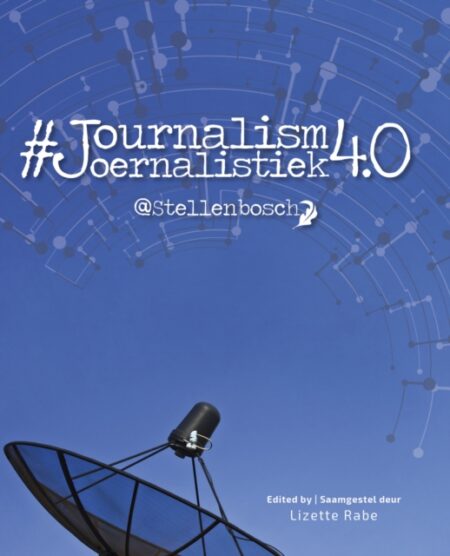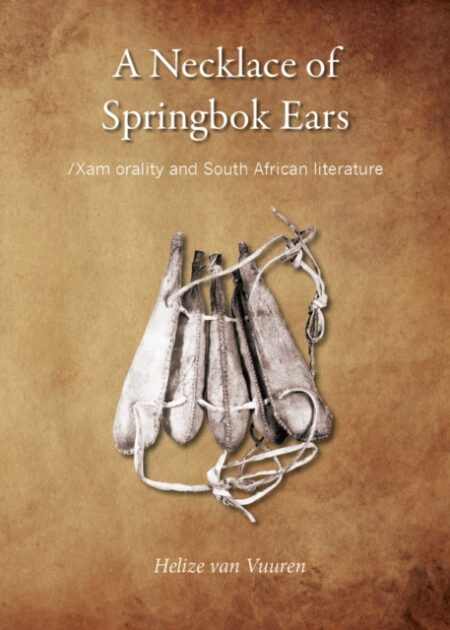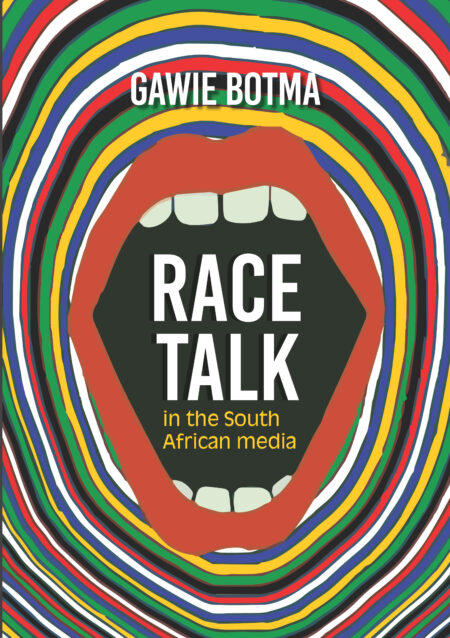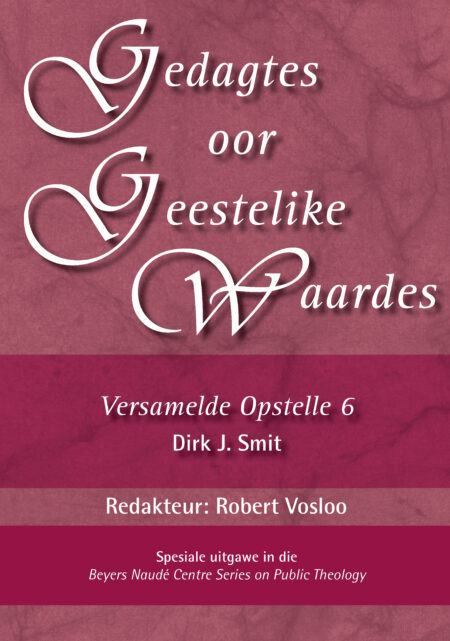-

#Journalism | #Joernalistiek4.0
0R350,00Stellenbosch University’s Department of Journalism celebrates its 40th anniversary with this publication reflecting on the four decades between 1978 and 2018 and all that happened behind 26 Crozier Street’s front door. But, in essence, it celebrates a lot more. It is an assessment of the importance of the media’s essential role in a democracy. This collection of essays, therefore, is a celebration of the inalienable right of freedom of expression, especially in the form of media freedom.
eBook: View eBook Version
-

#Journalism4.0 #Joernalistiek4.0
0R0,00Stellenbosch University’s Department of Journalism celebrates its 40th anniversary with this publication reflecting on the four decades between 1978 and 2018 and all that happened behind 26 Crozier Street’s front door. But, in essence, it celebrates a lot more. It is an assessment of the importance of the media’s essential role in a democracy. This collection of essays, therefore, is a celebration of the inalienable right of freedom of expression, especially in the form of media freedom.
Print: View Print Version
-

A Luta Continua
0R520,00What has media freedom entailed over the couple of centuries and successive governments of the geopolitical region that became South Africa since it was colonised by Westerners? And why can media freedom be described as both pillar and cornerstone of a democracy? ItOs simple, as in the words of Nelson Mandela, first state president of a democratic South Africa: Press freedom is the Olifeblood of democracyO.
This book tells the tale of the various states of press freedom, or unfreedom, from colonial times to today from a British governor called a dictator and a despot, through apartheidOs OpigmentocracyO, or OsjambokracyO, where the rule of law Ohas been replaced by the rule of the whipO, up to the dawn of liberation, with media freedom entrenched in Article 16 of South AfricaOs Bill of Rights.
And why should all of this concern you? Because media freedom is not about the freedom of the media. It is about your freedom. As was formulated by an editor under apartheid: OIf we donOt have a public sympathetic to a free press, not only will we not have a free press, we wonOt have a democracy either.O Or, in the words of former Sowetan editor and SANEF chair, Mpumelelo Mhkabela: OMedia freedom has nothing to do with the media, but with the freedom of citizens.O
And that is why you should know that a free media is the only guarantee for your freedom. As we have seen, both under apartheid and also under a democratic dispensation, it is a matter of a luta continua. The struggle continues. But you, the public, are the guardian of those that guard democracy. Help ensure the rights of a free media, and thereby your democratic rights and a democratic South Africa.
eBook: View eBook Version
-

A Necklace of Springbok Ears
0R390,00?Where once there were twenty-nine San Bushman languages (and/or dialects) in Southern Africa…few now remain.The loss of these languages results in the loss of their stored oral culture and indigenous knowledge. All that remains are archaeological evidence and rock art, or archives recorded by individuals, such as Wilhelm Bleek, Lucy Lloyd and GR von Wielligh, who heard the encroaching language and cultural death knell before it was too late.?
eBook: View eBook Version
-

Christian Identity
0R215,00This book is rooted in the quest for Christian identity in the Southern African context where Christianity is faced with many stark challenges, internal tensions and experiences of rapid social change.
The book explores six aspects of the highly complex notion of Christian identity, namely Christian institutions, a Christian ethos, Christian rituals, Christian experiences (with specific reference to the notion of faith), Christian narratives (with specific reference to the category of revelation and the place of the Bible in the Christian tradition) and Christian doctrine.
Ebook: View eBook Version
eBook: View eBook Version
-

Die verhaal van die Griekse Taal oor 35 Eeue heen
0R0,00Vir die eerste keer in Afrikaans (die jongste Westerse taal wat in die afgelope eeu reeds sy eie unieke letterkunde geskep het) word die verhaal van Grieks vertel, die oudste Westerse taal waarin feitlik al die bekende literere genres hul weergalose vorm en gestalte gekry het. Hoewel hierdie publikasie basies linguisties van aard is, poog die skrywer om die dramatis personae self ook aan die woord te stel in plaas van om net in taalkundige jargon te verval. Om ‘n werk soos hierdie saam te stel, vereis kundigheid in verskeie vaksubgebiede wat begin by oer-Grieks in sy sillabiese lynskriffases A en B. Die Grieks van die Goue Era van Perikles se Athene (circa 500 v.C.) is die bekendste. Min mense besef egter dat Homeros bedrieglik pre-klassiek is. Die klassieke Griek kon sy twee groot eposse (die Ilias en die Odusseia) nie sonder meer vlot lees nie. Dit was hulle Chaucer en Shakespeare. Die Griekse NT is sekerlik die belangrikste dokument wat ooit in Grieks opgestel is, hoewel dit stilisties nie naastenby die beste is nie. Vir sy bespreking van veral die semantiek van Moderne Grieks gebruik die skrywer hier vir die eerste keer dr. Philip Nicolaides se uitvoerige Grieks-Afrikaanse Woordeboek van 843 foliogrootte bladsye. Dis teen die middel van die vorige eeu opgestel, maar is nooit gepubliseer nie. Gerrit Kruger besit vandag die enigste (oorspronklike) kopie daarvan.
Print: View Print Version
-

Festschrift Rufus H. Gouws
0R390,00The range of languages covered by the lexicographicinvestigations reported on, e.g. Afrikaans, English, Northern Sotho, Yilumbu, Fang, French and Dutchis a clear indication of the wide-ranging influence ofRufus Gouws, to whom the work is dedicated.
-

Gewone Taal
0R380,00Gewone Taal: On Oorsig is On boek oor hoe skrywers skryf en lesers lees. Die inhoud van die boek betrek skryf- en leesprobleme op woord-, sins- en teksvlak. Die boek fokus merendeels, maar nie uitsluitlik nie, op regstekste omdat hierdie tekstipes vir ontoeganklikheid en ondeursigtigheid vir nie spesialislesers berug is. Een groot bydrae is die kontrolelys wat leiding aan skrywers bied oor watter konstruksies hulle liefs moet vermy en watter konstruksies hulle met groot nut kan gebruik. Hierbenewens word heelwat praktiese toepassingsvoorbeelde voorsien, wat demonstreer hoe komplekse konstruksies op verskillende teksvlakke herskryf kan word om leesbegrip te verhoog. Hoewel die boek On sterk teoretiese begronding het, gaan dit ook om die toepassing daarvan in die praktyk, met die uiteindelike doel om gewone mense te bemagtig en sodoende hulle basiese reg op toegang tot inligting te verwesenlik.
-

Interpreting terminology | Terminologie van het tolken | Tolkterminologie | Mareo a botoloki | Amatemu okutolika
0R250,00This dictionary of interpreting terminology is aimed at people who are being trained as interpreters, interpreter trainers, people who work as interpreters, or scholars who engage in research in the field of interpreting and who are looking for interpreting terms, either in English, Dutch, Afrikaans, Northern Sotho or Zulu. The localisation and translation of the dictionary were guided by the interpreting context in South Africa, which so often differs markedly from contexts in other countries.
-

Language and the Law
0R500,00Language and the Law: Global Perspectives in Forensic Linguistics from Africa and beyond is the third volume in a series of books designed to contribute and respond to growing interest in forensic linguistics or language and the law on the African continent. Drawing mostly on contexts where traditional African laws and Western laws are practised side-by-side, and where there are discontinuities between local knowledge systems, belief systems and language practices on the one hand, and official languages of law discourse, conceptualisation and jurisprudence documentation on the other, the chapters in this volume problematise, among other issues, the mediation practices (or lack thereof) of language and legal processes, discourse strategies and complexities in (mis)interpretations in second language court contexts and the miscarriage of justice that these may entail.
eBook: View eBook Version
-

Language and the Law
0R400,00Language and the Law: Global Perspectives in Forensic Linguistics from Africa and beyond is the third volume in a series of books designed to contribute and respond to growing interest in forensic linguistics or language and the law on the African continent. Drawing mostly on contexts where traditional African laws and Western laws are practised side-by-side, and where there are discontinuities between local knowledge systems, belief systems and language practices on the one hand, and official languages of law discourse, conceptualisation and jurisprudence documentation on the other, the chapters in this volume problematise, among other issues, the mediation practices (or lack thereof) of language and legal processes, discourse strategies and complexities in (mis)interpretations in second language court contexts and the miscarriage of justice that these may entail.
Print: View Print Version
-

Living Through Languages
0R290,00Living through Languages: An African Tribute to Ren Dirven is a collection of scholarly research meant to honour the various facets of his academic legacy, which includes language policy and politics, language acquisition (specifically in multilingual societies), the role of English and English language teaching, and a life-long interest in cognitive linguistics.


